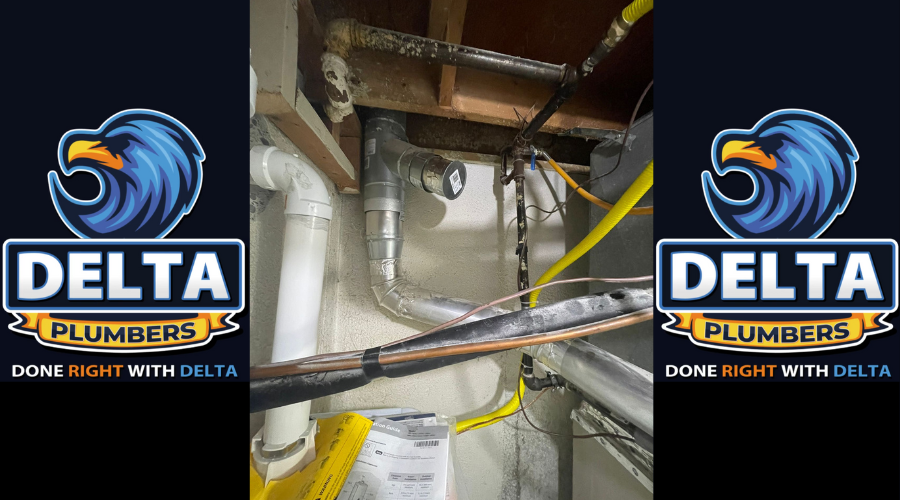Pipe insulation plays a critical role in maintaining the efficiency and safety of plumbing systems. Whether you’re dealing with cold water pipes, heating pipes, or any other type of plumbing, proper insulation offers a range of benefits. In this guide, we’ll explore the importance of insulating your pipes, addressing frequently asked questions, and discussing the most effective methods and materials.

Picture Source – Delta Plumbers
Is it Worth Insulating Cold Water Pipes?
Yes, insulating cold water pipes is absolutely worth it. Many homeowners underestimate the benefits of insulating cold water pipes, assuming it’s only necessary for hot water lines. However, there are several advantages:
1. Prevention of Condensation:
Cold water pipes often develop condensation, especially in humid environments. This “sweating” can lead to moisture-related issues like mold growth, mildew, and water damage to walls or ceilings. Insulation acts as a barrier, reducing condensation and protecting your home from these problems.
2. Energy Efficiency:
While cold water pipes don’t carry heated water, insulating them prevents heat transfer from the surrounding environment, keeping water cooler and reducing strain on refrigeration systems like ice makers. This ensures consistent performance and lowers energy costs over time.
3. Protection Against Freezing:
In colder climates, uninsulated cold-water pipes are at a higher risk of freezing, which can lead to pipe bursts and costly repairs. Insulation helps maintain a more stable temperature, reducing this risk significantly and providing peace of mind during winter months.
4. Enhanced Longevity:
By preventing moisture buildup and potential damage, insulation extends the lifespan of cold-water pipes, reducing the need for frequent repairs or replacements, saving you time and money.
Also Read: Fix a Running Toilet: A Complete Guide

Picture Source – Delta Plumbers
Does Insulating Heating Pipes Make a Difference?
Absolutely! Insulating heating pipes offers significant benefits that directly impact energy efficiency, comfort, and cost savings:
1. Minimized Heat Loss:
Insulated pipes retain heat more effectively, ensuring that hot water reaches your taps or radiators at the desired temperature. This reduces energy waste and helps you save on your utility bills.
2. Improved Heating Efficiency:
Insulation ensures that heat is directed where it’s needed, reducing the workload on boilers and heaters. This not only enhances heating efficiency but also prolongs the lifespan of your heating equipment.
3. Safer Operation:
Insulated heating pipes are less likely to cause burns or injuries, particularly in households with children or pets. The insulation acts as a protective layer, ensuring safety during daily use.
4. Reduced Noise:
Heating pipes can generate noise as water flows through them, especially in older systems. Insulation dampens these sounds, providing a quieter and more comfortable home environment.
5. Extended System Life:
By reducing wear and tear on heating systems, insulation contributes to their longevity, lowering maintenance and replacement costs over time.
Also Read: Role of Plumbing in Home Renovations

Picture Source – Delta Plumbers
What Is the Main Purpose of Insulation on Piping Systems?
The primary purpose of pipe insulation is to regulate temperature and protect the piping system from environmental factors. Key objectives include:
1. Thermal Regulation:
Insulation helps maintain the desired temperature of the water or fluid within the pipes, minimizing energy loss and improving efficiency for both hot and cold-water systems.
2. Freeze Protection:
In cold climates, insulation prevents water from freezing and causing pipe bursts, which can lead to extensive damage and costly repairs. It’s a proactive measure that safeguards your home.
3. Condensation Prevention:
By acting as a barrier, insulation prevents condensation that can lead to water damage, mold, and mildew, keeping your property safe and healthy.
4. Energy Savings:
Proper insulation reduces energy consumption by maintaining efficient heating and cooling systems. This translates to lower energy bills and a reduced environmental footprint.
5. Safety Enhancement:
Insulated pipes reduce the risk of burns and other injuries by keeping surface temperatures safe, especially in systems that handle high-temperature fluids.
6. Noise Reduction:
Insulation dampens vibrations and noise, ensuring a quieter plumbing system. This is particularly beneficial in multi-story homes or apartment buildings.
Also Read: The Benefits of Using Eco-Friendly Plumbing Products

Picture Source – Delta Plumbers
Will Pipes Freeze if Insulated?
While pipe insulation significantly reduces the likelihood of freezing, it does not make pipes entirely immune to extreme conditions. Here’s how insulation works in this context:
1. Slower Heat Loss:
Insulation slows the rate at which heat escapes from the water inside the pipes, giving you more time to address freezing temperatures. It’s especially helpful during short cold snaps.
2. Temperature Maintenance:
Insulation helps maintain a more stable temperature, reducing the risk of freezing during short periods of extreme cold. However, sustained freezing temperatures may still pose a challenge.
3. Supplementary Measures:
In areas with severe winters, combining insulation with additional precautions—like heating cables or keeping faucets slightly open to maintain water flow—provides optimal protection against freezing. These measures complement the insulation’s protective capabilities.
It’s important to note that while insulation is highly effective, extreme conditions may require proactive measures to prevent freezing altogether.
Also Read: Prevent Plumbing Issues During Cold Weather: A Complete Guide

Picture Source – Delta Plumbers
How Effective Is Pipe Insulation?
Pipe insulation is highly effective when installed correctly and combined with appropriate materials for the specific application. Its effectiveness depends on:
1. Material Choice:
Different materials—such as foam, rubber, or fiberglass—offer varying levels of thermal resistance and durability. Selecting the right material for your needs ensures optimal performance and long-lasting benefits.
2. Proper Installation:
Gaps or poorly secured insulation can reduce its effectiveness. Professional installation ensures full coverage and maximized benefits, preventing unnecessary heat loss or condensation.
3. Environmental Factors:
Insulation is most effective when tailored to the surrounding environment, such as indoor vs. outdoor applications or exposure to extreme temperatures. Customized solutions deliver the best results.
4. Maintenance:
Over time, insulation can degrade due to wear, moisture, or pests. Regular inspections and maintenance preserve its effectiveness, ensuring consistent performance.
5. Application:
Insulation is especially effective in reducing energy costs, preventing freezing, and minimizing condensation, making it a valuable investment for both residential and commercial properties. It’s a cost-efficient way to enhance your plumbing system’s functionality.
Also Read: Plumbing Codes and Regulations: Understanding Everything

Picture Source – Delta Plumbers
Where Should Pipes Be Insulated?
To maximize the benefits of pipe insulation, focus on the following areas:
1. Exposed Pipes:
Pipes in unheated spaces like basements, attics, garages, and crawl spaces are most vulnerable to freezing and heat loss. Insulating these pipes protects your plumbing from extreme temperature fluctuations.
2. Outdoor Pipes:
Any pipes exposed to the elements should be insulated to prevent freezing and damage. Outdoor insulation is particularly critical during harsh winters.
3. Near Energy Sources:
Pipes close to boilers, heaters, or air conditioning units benefit from insulation to reduce heat transfer and improve efficiency, ensuring optimal energy use.
4. Hot Water Pipes:
Insulating hot water lines minimizes heat loss, ensuring water stays warm and reducing energy consumption. This is especially beneficial for homes with long pipe runs.
5. Cold Water Pipes:
Insulate cold water pipes in humid environments to prevent condensation and associated issues like mold growth and structural damage.
6. Critical Areas:
Focus on pipes near walls or ceilings that may be exposed to fluctuating temperatures. Insulating these areas enhances overall system performance and prevents localized issues.
Also Read: How to Install a Garbage Disposal

Picture Source – Delta Plumbers
What Type of Insulation Should Be Used on a Pipe?
Choosing the right type of insulation is crucial for maximizing effectiveness and durability. Common options include:
1. Foam Insulation:
Lightweight and easy to install, foam insulation is ideal for both hot and cold-water pipes. It offers excellent thermal resistance and is cost-effective, making it a popular choice for homeowners.
2. Rubber Insulation:
Flexible and durable, rubber insulation is resistant to moisture and ideal for environments with fluctuating temperatures. Its versatility makes it suitable for a range of applications.
3. Fiberglass Insulation:
Suitable for high-temperature pipes, fiberglass insulation provides robust thermal resistance but requires protective jackets for moisture-prone areas. It’s often used in industrial and commercial settings.
4. Foil-Backed Insulation:
This type combines foam or rubber with a reflective outer layer, enhancing energy efficiency by reducing radiant heat loss. It’s particularly effective for heating systems.
5. Pre-Slit Tubes:
Pre-slit or Snap-On insulation tubes are easy to install and provide full coverage, making them a popular choice for residential applications. They are user-friendly and efficient.
6. Spray Foam:
For irregularly shaped pipes or hard-to-reach areas, spray foam insulation provides a customizable solution. It fills gaps and creates a seamless protective layer.
Each material has its advantages, so consider factors like temperature, moisture exposure, and location when making your choice. Professional plumbing guidance ensures the best selection for your needs.
Conclusion –
Insulating your pipes is a smart investment that enhances energy efficiency, protects against freezing, reduces noise, and extends the lifespan of your plumbing system. By choosing the right materials and ensuring proper installation, you can enjoy the full range of benefits. Whether you’re dealing with cold water pipes, heating systems, or exposed outdoor lines, pipe insulation is an essential component of a well-maintained home. For professional guidance and expert installation, contact Delta Plumbers today and ensure your plumbing system is protected year-round.









